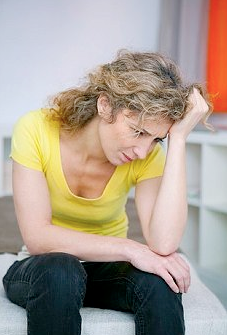 Premenstrual syndrome, or PMS, affects nearly half of all women of childbearing age, according to pharmacist Marla Ahlgrimm. Its symptoms are different for each sufferer and can range from irritability and severe mood swings to migraines and seizures in those women most adversely affected by PMS.
Premenstrual syndrome, or PMS, affects nearly half of all women of childbearing age, according to pharmacist Marla Ahlgrimm. Its symptoms are different for each sufferer and can range from irritability and severe mood swings to migraines and seizures in those women most adversely affected by PMS.
Common symptoms of PMS
Marla Ahlgrimm explains that, although PMS is associated with over 150 symptoms, most women tend to report a combination of two or more of the following:
- Anxiety
- Water retention
- Forgetfulness
- Bloating
- Breast tenderness
- Joint pain and swelling
- Cravings for carbohydrates/sweets (especially chocolate)
- Back pain
- Depression/uncontrollable crying
- Irritability
- Headache
- Extreme fatigue
- Acne
Many women with PMS report adverse reactions to oral contraceptives; others find symptoms increasing in severity after sterilization or hysterectomy, says Marla Ahlgrimm. One primary difference between simple menstrual cycle related discomfort and true PMS is the timing of symptoms. According to Marla Ahlgrimm, women with PMS experience their symptoms during the 2 weeks before menstruation and typically have pain-free periods.
PMS: A difficult diagnosis
Despite medical advancements and social acceptance over the last 30 years, PMS is one condition that cannot be diagnosed via laboratory testing, points out Marla Ahlgrimm. Confirming the existence of premenstrual syndrome is a subjective matter; only a woman and her doctor working together can give her symptoms the label of PMS and thus prescribe a potential treatment. The best thing a woman can do if she believes she has PMS is to chart her symptoms for two or three consecutive cycles and present the evidence to her doctor.
Possible causes of PMS
Marla Ahlgrimm explains that there is no definitive cause that can be traced to all cases of PMS. However, experts agree the most probable culprits are related to deficiencies that occur within the body. These include low blood sugar, unusually low progesterone, high prolactin, thyroid disorders, stress, malnutrition, or vitamin deficiencies.
Treatment of PMS
Since PMS has so many different contributing factors there is no one known “cure.” PMS may be treated with natural hormone replacement therapy, special nutritional supplements, lifestyle training, or diet and exercise.













 Marla Ahlgrimm has co-authored two ground-breaking books,
Marla Ahlgrimm has co-authored two ground-breaking books,